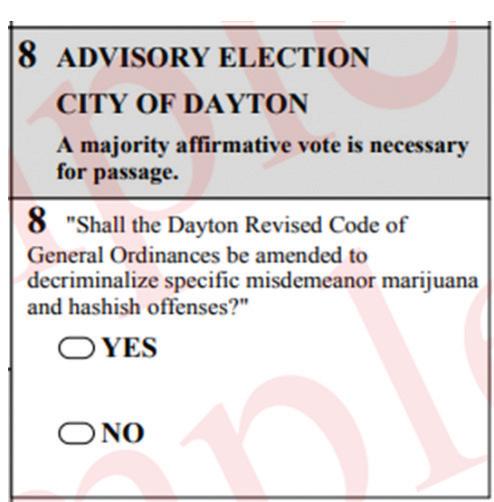
2 minute read
YOUNG LAWYERS DIVISION
Municipal Reform of Marijuana Possession
By Martin W. Gehres Co-Chair Young Lawyers Division City of Dayton Law Department
Advertisement
Over twenty-five years ago, presidential candidate Bill Clinton admitted that he “experimented with marijuana a time or two [but] I didn’t inhale it[.]” Commentators at the time opined that this admission could potentially end his political career. Fast forward to today, primary presidential candidate Senator Bernie Sanders promised to legalize marijuana and vacate and expunge all past marijuana-related convictions.
Further, this evolution on the issue of marijuana is shown by state and municipal reforms. Eleven states have “legalized” the recreational use of marijuana for adults over the age of twenty-one. Two of these states, Michigan and Illinois, are just a brisk four-hour drive from Dayton. In a majority of these states, the state issues permits/licenses to allow the sale of recreational marijuana through dispensaries. These dispensaries often have a variety of products, to include: marijuana (variety of strands), chocolates, gummies, drinks, vapors, oils, and so on.
States have found that the “legalization” of marijuana has been profitable with the potential of raising millions of dollars in tax revenue. In January of 2020, Illinois reported generating more than ten million dollars in tax revenue from legal marijuana sales.
States are not the only governmental body reexamining their relationship with marijuana. In November of 2018, voters in the City of Dayton had the opportunity to determine whether to reduce criminal marijuana penalties in Dayton. Over seventy percent of Dayton voters were in favor of the City proposed changes. Subsequently, Dayton City Commission voted unanimously in favor of changing its Revised Code to reflect the will of its residents. Cincinnati (5-3), Columbus (unanimously), and Cleveland (15-2) have recently passed similar legislation. These municipal reforms share common characteristic. First, these municipal reforms concern misdemeanor marijuana possession (possession of 200 grams or less). Second, the fines for violating these statutes are usually a nominal amount or zero dollars. Dayton, Cincinnati, and Cleveland reduced their fine to

$0.00. While, Columbus reduced their fine to $10.00 for possession of 100 grams and $25.00 for possession of 200 grams. It is important to note that marijuana remains illegal in the state of Ohio and that the Revised Code has its own fine structure concerning misdemeanor possession of marijuana.
Although these municipal reforms have not legalized marijuana in Ohio, they have had an impact on criminal and social justice in their cities. Dayton’s ordinance resulted in a significant, approximately 70%, decline of minor misdemeanor marijuana charges filed in Dayton Municipal Court. One thing is clear inhaling marijuana will no longer cause your career to go up in smoke.












